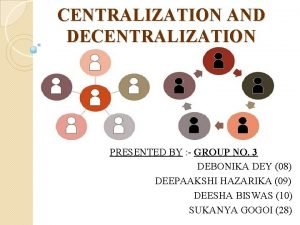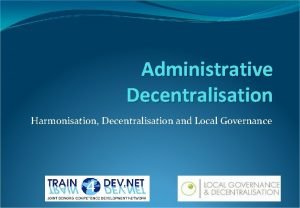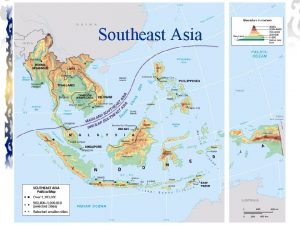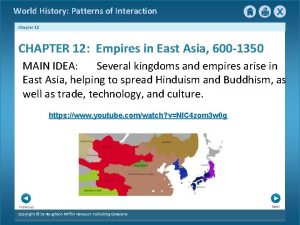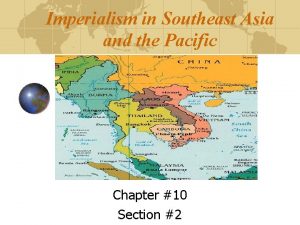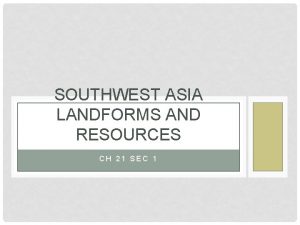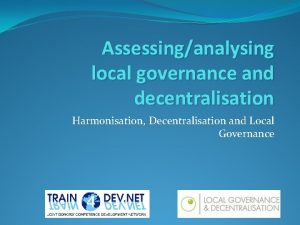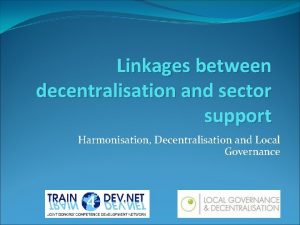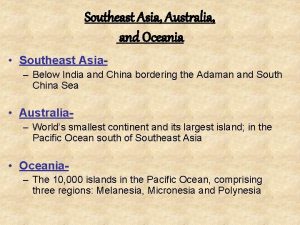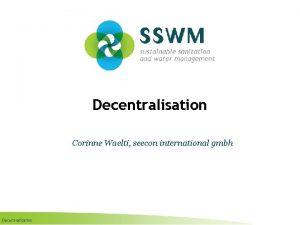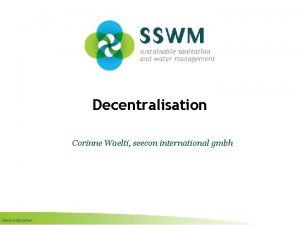LOCAL GOVERNMENT AND DECENTRALISATION IN SOUTHEAST ASIA Asia










- Slides: 10

LOCAL GOVERNMENT AND DECENTRALISATION IN SOUTHEAST ASIA Asia Institute, University f Tasmania, 18/11/19 Andrew Harding, Centre for Asian Legal Studies, National University of Singapore


Background and orientation of the project Decentralisation has become ubiquitous, not least in SE Asia (almost all states have decentralised in last 30 years or so) Generally linked with development and democratic entrenchment; or with ethnic/ religious pluralism/ identity? Local government is important in its impact on everyday life, eg planning, environment, land, transport But also in terms of democracy, participation, accountability (federalism all the way down? ) I define decentralisation as progressive empowerment of local self-government; not deconcentration, and not special devolution

Why SE Asia? SEA as a laboratory of pluralism Sub-national constitutionalism of any kind virtually absent in constitutional law literature Under-explored in the DCN literature, which is country-based, empirical, and mainly about ‘fiscal federalism’ or administrative efficiency DCN contemporaneous with, and linked with, democratic development Theory-building? (But individual cases do matter!)

My specific questions … 1 Why do states decentralize? 2 Where does the model come from? Colonial law? 3 Given successful development under the ‘Asian developmental state’ since 1960 s, how does DCN relate to the ADS? 4 Does decentralization represent an entrenched constitutional right to local self-government? Or is it just a strategy for efficient public administration? How much control does the centre still have under the new central-local relations? 5 Does local/regional government reflect local culture/ identity/ tradition, or just standard administrative units (are they ‘organic’ or ‘administrative’? ) 6 What problems have been encountered? How successful has decentralisation been? How do we judge success?

Example: Indonesia 1999 -2019 has moved from a ‘highly centralized militarized state to one of the most decentralized in the world’ (Lindsey and Butt) Purpose was to outflank separatism Local democracy in 34 provinces (8 new ones since 1999), more than 500 regencies/ cities, 6. 5 k districts, and 83 k villages (asymmetrical devolution in Aceh, A secial legislative body (DPR) comprising regional representatives advises on regional impacts of legislation Uneven and sometimes unintended consequences, e. g. revival of the nagari and adat governance in W Sumatra Village Law 2015 and concept of adat villages Does DCN simply decentralize corruption?

Other cases to look at Philippines: Extensive DCN since 1991 Local Government Code Malaysia: Demand for restoration of local elections since 1970 s Thailand: DCN process entrenched in last 3 constitutions (1997, 2007, 2017) Myanmar: 5 levels of government, 2008 CN provides for DCN …

Hypotheses based on preliminary research DCN is driven by post-1990 development as well as desire for local autonomy Systems are to some extent based on traditional units (eg, nagarification v desafication) Extent of entrenchment in constitution does bear relation to the seriousness and extent of local autonomy DCN impacts democratic nature of the state as a whole We need to rethink our narrative of the ADS Success and failure: ‘treat those two imposters just the same’? (Kipling)

The dreaded so-what question? Individual cases matter Democratic local self-government matters Local identity and locality matter SE Asia usually challenges general conclusions Constitutional design matters

 1982 loi de décentralisation
1982 loi de décentralisation Différence déconcentration décentralisation
Différence déconcentration décentralisation Déconcentration et décentralisation différence
Déconcentration et décentralisation différence Decentralisation in management
Decentralisation in management Def décentralisation
Def décentralisation Decentralisation, diversification, connectivity, simplicity
Decentralisation, diversification, connectivity, simplicity Wallace's line
Wallace's line Chapter 12 section 5 kingdoms of southeast asia and korea
Chapter 12 section 5 kingdoms of southeast asia and korea Imperialism in southeast asia and the pacific
Imperialism in southeast asia and the pacific African city model
African city model Landforms of southeast asia
Landforms of southeast asia



